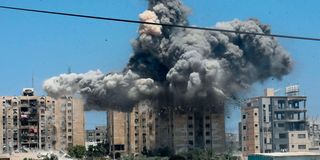Premium
IMF says escalation of Middle East conflict poses significant economic risks

Smoke rises after an explosion following an Israeli air strike on a residential building, amid the Israel-Hamas conflict, in Nuseirat in the central Gaza Strip, July 20, 2024.
The International Monetary Fund said on Thursday an escalation of the conflict in the Middle East could have significant economic ramifications for the region and the global economy, but commodity prices remain below the highs of the past year.
IMF spokesperson Julie Kozack told a regular news briefing that the Washington-based global lender is closely monitoring the situation in southern Lebanon with "grave concern" and offered condolences for the loss of life.
"The potential for further escalation of the conflict heightens risks and uncertainty and could have significant economic ramifications for the region and beyond," Kozack said.
She said it was too early to predict specific impacts on the global economy, but noted that economies in the region have already suffered greatly, especially in Gaza, where the civilian population "faces dire socioeconomic conditions, a humanitarian crisis and insufficient aid deliveries.
The IMF estimates that Gaza's GDP declined 86 percent in the first half of 2024, Kozack said, while the West Bank's first-half GDP likely declined 25 percent, with prospects of a further deterioration.
Israel's GDP contracted by about 20 percent in the fourth quarter of 2023 after the conflict began, and the country has seen only a partial recovery in the first half of 2024, she added.
The IMF will update its economic projections for all countries and the global economy later in October when the global lender and World Bank hold their fall meetings in Washington.
"In Lebanon, the recent intensification of the conflict is exacerbating the country's already fragile macroeconomic and social situation," Kozack said, referring to Israel's air strikes on the Iranian-backed Hezbollah militant group in Lebanon.
"The conflict has inflicted a heavy human toll on the country, and it has damaged physical infrastructure."
The main channels for the conflict to impact the global economy have been through higher commodity prices, including oil and grains, as well as increased shipping costs, as vessels avoid potential missile attacks by Yemen's Houthi militants on vessels in the Red Sea, Kozack said. But commodity prices are currently lower than their peaks in the past year.
"I just emphasize once again that we're closely monitoring the situation, and this is a situation of great concern and very high uncertainty," she added.
Lebanon in 2022 reached a staff-level agreement with the IMF on a potential loan program, but there has been insufficient progress on required reforms, Kozack said.
"We are prepared to engage with Lebanon on a possible financing program when the situation is appropriate to do so, but it would necessitate that the actions can be taken and decisive policy measures can be taken," Kozack added. "We are currently supporting Lebanon through capacity development assistance and other areas where possible."





